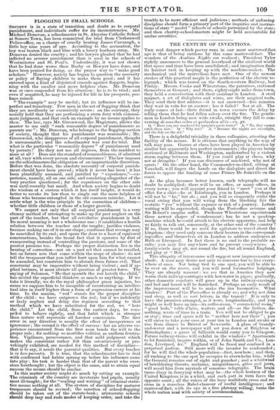THE CENTURY OF INVENTIONS.
THE real danger which poetry runs in our most matter-of-fact age is that of being outdone by this same matter-of-fact. The wonders of the Arabian Nights are realized ; President Tyler rightly announces to the general loverhood of the civilized world that space and time have been annihilated ; and imagination finds its hardest task in keeping up with the machine-maker. The mechanical and the marvellous have met. One of the newest strokes of this practical magic is the perfection of the electric te- legraph; which was tested on the South-western Railway, last Friday. Messrs. Cooke and Wheatstone, the patentees stationed themselves at Gosport ; and there, eighty-eight miles from town, they held a conversation with their assistant in London. A steel magnet, a set of dial-plates and wires, are their magical tools. They send their first address—it is not answered—five minutes they wait in vain for an answer : has it failed? Not at all. The reply comes at last—their friend in town excuses the delay by telling them that he had fallen asleep over the fire. The gentle- man in London being now wide awake, straight they fall to con- versing de omnibus rebus et quilnisdam aliis—ex. gr.
Q. "Have you any mackerel for tonight's goods train?' A. " No, they cannot catch them now." Q. "Why not?' A. "Because the nights are moonlight, and the fish see the net."
There is a delightful triviality in these colloquies, attesting the facility of the means. It is obvious that anything in the way of talk may pass. Games at chess have been played in America by similar but apparently less perfect instruments ; the players being stationed at Baltimore and Washington, undisturbed by a violent storm raging between them. If you could play at chess, why not at draughts ? If you can discourse of mackerel, why not of sprats ? On the other hand, the Commander-in-chief, sitting at Vauxhall, will finger the hands on the dial-plate and direct the forces to oppose the landing of some Prince Be Joinville on the coast.
As the plan becomes better known, such telegraphs will no doubt be multiplied: there will he an office, or many offices, in every town ; you will appoint your friend to " meet ' you at the office for a chat—he at Edinburgh, you in London. Perhaps it will not be "he," but she ; and you will so eloquently strike the vocal string that you will wring from the blushing fair the ecstatic "yes" without the expense or risk of a journey. Letter- writing will be superseded, though the Post-office revenue and Sir Robert's surplus suffer. Professor Wheatstone superintends these newest shapes of wonderment : has he not a speaking- machine which he could attach to his electric apparatus, and help us fairly to talk out, sonorously., at the other end of the country'? If so, there would be no need for agitators to travel about the kingdom : they need only convene their hearers in the correspond- ing-office and themselves sit in London to address audiences at Bath or Liverpool. In fact there is no end to the probable re- sults : you may live anywhere and be present everywhere. A family-circle may sit, not round the fire, but all round England, and play at "Bob." This ubiquity of intercourse will suggest new improvements of abode. A man may desire not only to converse but to live every- where at once. Not being tied to one spot, you will be able to be ever on the move, and you will need locomotive lodgings. They are already nascent : we see that in America they now warm their railway-carriages with hot-water in pipes ; gradually, other domestic comforts will grow up in the railway-carriage, and bed and board will be furnished. Perhaps an early result of the improvement will be to make the inn locomotive. What hinders? Part of the Post-office is already so ; and why not dine and sleep, as well as sort letters, in the transit ? It is only to have the premises arranged, as it were, longitudinally, and you might as well have an inn—its coffee-room, "commercial room," "good beds," table d'hôte, waiters and all—as the listless, do- nothing, waste of time in a train. You will not be obliged to go or stay; time and space will be " neither here nor there" ; you will enter to take your ease at your inn in London and awake or rise from dinner in Bristol or Newcastle. A glass of brandy- and-water and a newspaper will set you down at Brighton or Birmingham ; a game at billiards would carry you to Glasgow. Future railway-trains will exhibit in the windows "Apartments to let furnished, inquire within, or of John Smith and Co., Lon- don, Liverpool, &c." England will be fused and confused in a perpetual motion. Still more will the invader be confounded ; for he will find the whole population—first, nowhere ; and then, all rushing to the one spot he occupies to overwhelm him, while the General remains out of sight and gunshot ; and a whirlwind of bewildering threats, acclaims, misguidances, gibes and jeers, will assail him from myriads of sonorous telegraphs. The brain turns dizzy in fancying what may be—the whole horizon of the United Kingdom is in a whirl, and each part in turn faces the opposite coast ; all the voices of the busy multitude cross and re- cross in a ceaseless Babel-clamour of useful intelligence ; and matter-of-fact, with its eye in a fine phrensy rolling, turns the whole nation mad with satiety of accommodation.


























 Previous page
Previous page